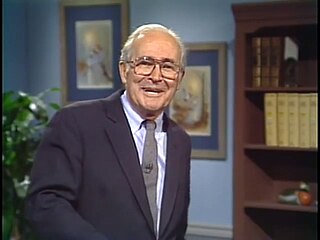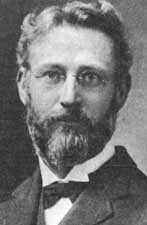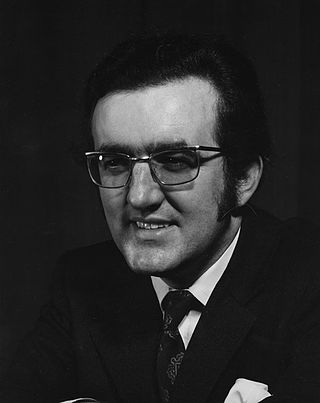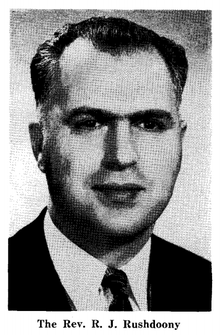
Gary Kilgore North was an American writer, Austrian School economic historian, and leading figure in the Christian reconstructionist movement. North authored or coauthored over fifty books on topics including Reformed Protestant theology, economics, and history. He was an Associated Scholar of the Mises Institute.

Francis August Schaeffer was an American evangelical theologian, philosopher, and Presbyterian pastor. He co-founded the L'Abri community in Switzerland with his wife Edith Schaeffer, née Seville, a prolific author in her own right. Opposed to theological modernism, Schaeffer promoted what he claimed was a more historic Protestant faith and a presuppositional approach to Christian apologetics, which he believed would answer the questions of the age.
In Christian eschatology, postmillennialism, or postmillenarianism, is an interpretation of chapter 20 of the Book of Revelation which sees Christ's second coming as occurring after the "Millennium", a messianic age in which Christian ethics prosper. The term subsumes several similar views of the end times, and it stands in contrast to premillennialism and, to a lesser extent, amillennialism.
Christian reconstructionism is a fundamentalist Calvinist theonomic movement. It developed primarily under the direction of R. J. Rushdoony, Greg Bahnsen and Gary North and has had an important influence on the Christian right in the United States. Its central theme is that society should be reconstructed under the lordship of Jesus in all aspects of life. In keeping with the biblical cultural mandate, reconstructionists advocate for theonomy and the restoration of certain biblical laws said to have continued applicability. These include the death penalty not only for murder, but also for idolatry, homosexuality, adultery, witchcraft and blasphemy.
Dominion theology, also known as dominionism, is a group of Christian political ideologies that seek to institute a nation governed by Christians and based on their understandings of biblical law. Extents of rule and ways of acquiring governing authority are varied. For example, dominion theology can include theonomy but does not necessarily involve advocacy of adherence to the Mosaic Law as the basis of government. The label is primarily applied to groups of Christians in the United States.
Theonomy is a hypothetical Christian form of government in which divine law governs societies. Theonomists hold that societies should observe divine law, particularly the Old Testament’s judicial laws. The movement’s chief architects are Gary North, Greg Bahnsen, and R.J. Rushdoony.
Gregory Lyle Bahnsen, credited in most of his books as Greg Bahnsen, was an American Calvinist philosopher and Christian apologist. He was a minister in the Orthodox Presbyterian Church and a full-time Scholar in Residence for the Southern California Center for Christian Studies (SCCCS). He is also considered a contributor to the field of Christian apologetics, as he popularized the presuppositional method of Cornelius Van Til. He is the father of David L. Bahnsen, an American portfolio manager, author, and television commentator.

John Henry Gerstner was an American Reformed and Presbyterian theologian and professor of Church History at Pittsburgh Theological Seminary and Knox Theological Seminary. He was an expert on the life and theology of Jonathan Edwards.
The Chalcedon Foundation is an American Christian Reconstructionist organization founded by Rousas John Rushdoony in 1965. Named for the Council of Chalcedon, it has also included theologians such as Gary North, who later founded his own organization, the Institute for Christian Economics.

Gary DeMar is an American writer and lecturer. A former student of Greg Bahnsen, and protégé of Gary North, he has written several books on Christian reconstructionism, apologetics, and eschatology, as well as books targeting the homeschool movement.

David Harold Chilton (1951–1997) was an American pastor, Reconstructionist, speaker and author of several books on economics, eschatology and Christian Worldview from Placerville, California. He contributed three books on eschatology: Paradise Restored (1985), The Days of Vengeance (1987), and The Great Tribulation (1987).

Geerhardus Johannes Vos was a Dutch-American Calvinist theologian and one of the most distinguished representatives of the Princeton Theology. He is sometimes called the father of Reformed Biblical theology.
Molly Worthen is a journalist and historian of American religion. She is a contributing opinion writer for The New York Times and a tenured professor at the University of North Carolina, Chapel Hill.
Vern Sheridan Poythress is an American philosopher, theologian, New Testament scholar and mathematician, who is currently the New Testament chair of the ESV Oversight Committee. He is also the Distinguished Professor of New Testament, Biblical Interpretation, and Systematic Theology at Westminster Theological Seminary and editor of Westminster Theological Journal.

Brian Griffiths, Baron Griffiths of Fforestfach, is a British economist, lecturer, and Conservative life peer.
In contrast with worship of a creator deity, the theological term creature worship is veneration of that which is created. In the biblical worldview, creature worship is seen as analogous to a reversal of the relationship between God and creature or the reversal of mindedness, which places power in the handiwork.

Cornelius Van Til was a Dutch-American Reformed theologian, who is credited as being the originator of modern presuppositional apologetics.
Kinism is the belief that the divinely ordained social order is tribal and familial as opposed to imperial and propositional. The term is often used to refer to a "movement of anti-immigrant, 'Southern heritage' separatists who splintered off from Christian Reconstructionism to advocate that God's intended order is 'loving one's own kind' by separating people along 'tribal and ethnic' lines to live in large, extended-family groups."

The Institutes of Biblical Law is a 1973 book by the philosopher and theologian Rousas John Rushdoony. It is the first volume of a three-volume work, also referred to by the same title, which is modeled after John Calvin's Institutes of the Christian Religion (1536). Together with Rushdoony's other writings, the book is the basis of Christian reconstructionism.

P&R Publishing is an evangelical, Reformed, Christian publishing company located in Phillipsburg, New Jersey. P&R publishes books that promote biblical concepts and Christian lifestyle according to the Westminster Confession of Faith and Catechisms.











